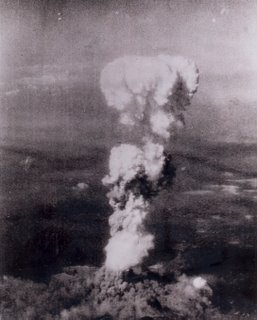
India's got'em, Pakistan too. Israel has plenty, North Korea has a few. Saddam wanted them and now so does Iran. Brazil may introduce them to South America in a few years. Russia, the United States, Britain, France and China have enough to turn the planet into a cinder. Nuclear weapons, are they coming to a neighbourhood near you?
The Nuclear Club is growing and the waiting list for admission seems to be growing. We know we want to curb nuclear proliferation but we don't spend a lot of time wondering what might happen if one of these mini-nuclear powers got into a scrap with an adversary, say India versus Pakistan. What would it mean to us here in Canada?
A Los Angeles times story claims that a nuclear exchange between India and Pakistan would hit hard around the world:
"Owen Toon, an atmospheric researcher at the University of Colorado, told a meeting of the American Geophysical Union on Monday that although a small nuclear exchange might not trigger a "nuclear winter" that would wipe out all life, it could cause as much death as was once predicted for a nuclear war between the US and the Soviet Union.
"'These results are quite surprising,' Dr Toon said. Regional nuclear conflicts 'can endanger entire populations' the way it was once thought only worldwide conflict could.
"Since the 1980s, when the US and Soviet Union began reducing their nuclear stockpiles, the number of weapons around the world has declined by a factor of three, Dr Toon said. There are now about 10,000 such weapons, and that is expected to drop to 4000 by 2012.
"But the number of potential nuclear-armed nations has risen dramatically. Dr Toon said 40 countries had the fissile material to build nuclear weapons. Many that could build them were unstable or in dispute with their neighbours.
"In conducting their research, the scientists looked at other global cataclysms, such as the 1815 eruption of Tambora volcano in Indonesia. It triggered the "year without a summer", which led to lethal frosts and crop losses in the north-eastern US and crop failures and famine in Europe.
"The authors said even a limited nuclear conflict would be much worse, killing as many as 17 million people in China alone.
"The biggest atmospheric impact from such an exchange would be the accumulation of smoke and soot in the atmosphere, said Professor Georgiy Stenchikov, of Rutgers University. He estimated 5 million tonnes of soot could be thrown into the air by the explosion of about 100 15-kiloton weapons. This would rise into the stratosphere and stay there for up to 10 years, causing temperatures to fall several degrees."
Can nuclear proliferation be stopped? At the very least it will require a return to robust, multilateralism and a collective willingness to accept and enforce nuclear disarmament. This will mean an end to the nuclear hypocrisy of the Big Five. Their obligation under the NNPT, the nuclear non-proliferation treaty, has been to dismantle their arsenals. Upon that obligation was founded the committment of the non-nuclear states not to develop or acquire nuclear weapons of their own. The Big Five refused to fulfil their part of the bargain and so, in turn, have smaller states.
Nuclear non-proliferation needs a top-down housecleaning. What are the chances?
No comments:
Post a Comment